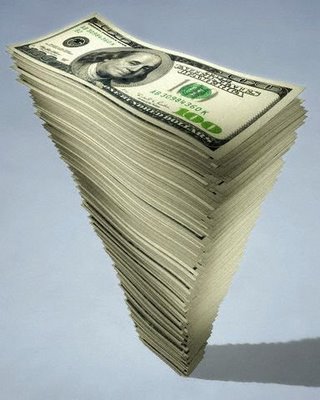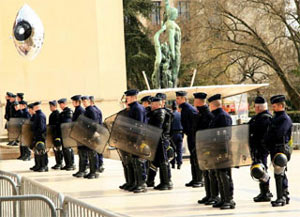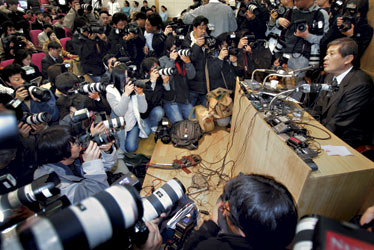You are hereWcP.Common.Sense's blog
WcP.Common.Sense's blog
Unforeseen consequences - 2002 vote for Iraq War dug $635bil hole in 6 yrs, now another vote $700bil to fill it?

(quote)
Like the momentous 2002 decision authorizing the invasion of Iraq, Congress' vote on a $700 billion financial industry bailout figures to reverberate unpredictably, both for the economy and for the politicians vowing to protect it.
The White House and congressional leaders already have made up their minds. Confronted with the defeat of an earlier measure in the House this week and increasingly urgent warnings of economic hardship, they've begun rounding up votes the old-fashioned way.
They're buying them.

A revised bailout bill includes tens of billions of dollars in tax breaks for the middle class, for homeowners who don't itemize their deductions, and for property owners in Alaska, Florida, Nevada, South Dakota, Texas, Washington and Wyoming. Add on the $3 billion funding dollop for rural school programs over the next five years. And another $8 billion over the same period in disaster aid, much of it for Midwestern states. And toss in unrelated legislation, far-reaching in its own right, requiring insurance plans to provide better benefits for mental health.
None of these has any direct bearing on the problem afflicting Wall Street and the entire economy. Yet in the currency of Congress, each is rapidly becoming part of the solution.
Yet if the vote on Iraq is any indication, the consequences will be more profound than even the lawmakers understood at the time. read more »
All the same: clone breaching lives’ uniqueness? S Korea reveals 1st dog clones - 1 dead dog into 5 identical ones

She has brought her precious pooch back from death, more than one but five – via cloning at the price of $50,000. Not the one unique dog Booger, but a bunch - FIVE!
Woken up at midnight by dear memory of the dead dog? Or thrilled by five identical dogs resembling the dead one? It is not a bad idea to hear from the very first commercial cloning client, or to imagine, the true sentiment before jumping to clone yours.
(quote)
(SEOUL, South Korea) — Booger is back. An American woman received five puppies Tuesday that were cloned from her beloved late pitbull, becoming the inaugural customer of a South Korean company that says it is the world's first successful commercial canine cloning service. Seoul-based RNL Bio said the clones of Bernann McKinney's dog Booger were born last week after being cloned in cooperation with a team of Seoul National University scientists who created the world's first cloned dog in 2005.
"These truths to be self-evident, that all men are created equal". $656 bil. for Iraq War? or for 37 mil. Americans in poverty?

(quote)
Today marks the birth of a notion as well as a nation
July 4, 2008
By Jerry Davich Post-Tribune metro columnist
"We hold these truths to be self-evident, that all men are created equal, that they are endowed by their Creator with certain unalienable rights, that among these are life, liberty and the pursuit of happiness."
When in the course of human events, it becomes necessary for a pampered, privileged, and not-so-patriotic newspaper columnist to finally take the time to read his nation's most hallowed document, it must seem like a sad state of affairs, I agree. Yet here I am, a 46-year-old Yankee Doodle Davich who not once has read every word in the Declaration of Independence, arguably the most masterfully written political prose of Western civilization. Oh, sure, I can be a patriotic pretender and regurgitate its revolutionary highlights, such as "self-evident truths," "unalienable rights," and "all men are created equal." But what does that all mean in 2008, in a country that went from 2.5 million people in 1776 to 305 million today, with who knows how many here illegally or what that really means?

In a country that riveted its global identity to become the economic leader, only to predictably lose that title to China. Or which has so far allocated $656 billion for the war in Iraq while millions of Americans go without food, health care, and proper education. And a country which only recently experienced its first "mountaintop moment" regarding civil rights, and possibly the not-so-self-evident truth that all men are created equal.
On June 28, 1776, Thomas Jefferson finished drafting the first version of the Declaration of Independence. On June 28, 2008, I began studying the final version in earnest. On July 4, 1776, the Continental Congress adopted the document, and it later served as an autographed preamble for the birth of a nation. On July 4, 2008, I'd like to use this space as a preamble for the birth of a notion: Between the cookouts, parades, and fireworks, how about we pause to reflect how the Declaration has stood the test of time. And what better time, on the nation's 232nd birthday, to spark a conversation of sovereign thought among free people.
What would they think?
I can't help but wonder what our founding fathers would think of America the Bountiful in the 21st century, in all its hope and hype, gore and glory, fakeness and flag-waving.

Would they condemn, condone, or celebrate a racially mixed presidential candidate? Or a middle-aged woman for that matter? Would they embrace or be aghast over the proliferation of guns? Or the recent Supreme Court ruling on the right to bear arms? Would they be surprised or surly over our global trade agreements with other countries, including the $107 billion of trade each year with the United Kingdom, our adversary in 1776, but our sixth-leading trading partner today? These are the questions I asked myself while reading the Declaration and its 56-signature endorsement.
Also, it seems our founding framers' clear, concise, and candid public declaration in 1776 has been replaced by red, white and often untrue political decoration in 2008, an election year. Rhetoric has replaced reasoning. Sound-bites have replaced sound thinking. Image has replaced imagination. Maybe my star-spangled skepticism seems un-American, but I feel there's a thin line between how we praise a "patriot" versus how we torment a "traitor."
Isn't it still our duty to be the watchdog of government, to secure our life, liberty, and pursuit of happiness, and if necessary to indict our leaders, just as the Declaration indicted King George III? Isn't it our duty to question whether our personal freedoms are being protected, protracted, or politically pawned away? Isn't it our duty to reconsider exactly what defines our so-called unalienable rights? Two centuries later, does the term still adhere to our basic human rights, or do we view them as more national than natural?

Who's a patriot today?
And where does the "Creator" still fit into this 232-year-old marriage between church and state? A recent poll showed an overwhelming majority of Americans are "absolutely certain" that God exists, but many of them don't believe in worshipping on a regular basis. Is there a parallel with those same Americans who genuinely believe in democracy but are not absolutely certain about our government?
And what defines a patriot these days, "a person who loves, supports, and defends his or her country and its interests with devotion," according to my dictionary. Or someone who must symbolically wear an American flag pin to prove it?
On the morning of July 4, 1776, church bells rang out when the Declaration was finally, and formally, adopted. But, I discovered, two statesmen ended up not signing it. John Dickinson clung to the idea of reconciliation with Britain, and Robert R. Livingston thought the Declaration was premature. Today I can only wonder about all the statesmen in 21st century America who would have joined Dickinson and Livingston, refusing to put their necks on the line for the birth of a notion, and a nation.
(unquote)
Images courtesy of Getty Images and Center for American Progress, and paintings by Gilbert Stuart and Arnold Friberg
Original Source: Post-Tribune and Center for American Progress
Japan Urges Limit on Cell Phone Use by Kids
(quote)
TOKYO (AFP) — A Japanese government panel called on parents and schools Monday to help limit the use of mobile phones by children to prevent them from accessing "harmful" information on websites. The advisory council on education made the proposal to Prime Minister Yasuo Fukuda as children become more prone to crimes involving dating websites and bullying on Internet school bulletin boards. The panel said it would urge "parents, schools and other people concerned to cooperate in preventing elementary and junior high school students from using mobile phones unless it is necessary." It called for limiting mobile phone use just to calls.
These measures are necessary to "protect children from harmful information and other negative influence involving the use of mobile phones" including "crimes and bullying," the report said. Press reports have linked some crimes by children to dating websites. "It is true that the use of mobile phones causes various problems," Fukuda told reporters. "I think the panel has made timely discussions on the problem." He added: "First of all, I wonder if there is any need for children to possess mobile phones."
While about a third of Japanese primary school students aged 7-12 use mobiles, by the time they get to high school that figure rises to 96 percent, according to a government survey last December. There are fears for students' safety as only about one percent of them have blocks on potentially harmful material, meaning they could reveal personal information, making them prey for fraudsters and pedophiles. But even on protected sites such as school bulletin boards, bullies are able to anonymously post comments without teacher oversight or intervention.
(unquote)
Images Courtesy of AFP and blog.pcnews.ro


Original Source: AFP
25,000 Dockworkers in 29 Ports on Strike - "End Iraq War", Bring Peace and Prosperity Back to US
"SEATTLE — West Coast ports were shut down on Thursday as thousands of longshoremen failed to report for work, part of what their union leaders said was a one-day, one-shift protest against the war in Iraq.
Cranes and forklifts stood still from Seattle to San Diego, and ships were stalled at sea as workers held rallies up and down the coast to blame the war for distracting public attention and money from domestic needs like health care and education.
“We’re loyal to America, and we won’t stand by while our country, our troops and our economy are being destroyed by a war that’s bankrupting us to the tune of $3 trillion,” the president of the International Longshore and Warehouse Union, Bob McEllrath, said in a written statement. “It’s time to stand up, and we’re doing our part today.”
About 25,000 union members are employed at 29 West Coast ports, but the protest took place only during the day shift. A spokesman for the main West Coast employers’ group, the Pacific Maritime Association, said it appeared that about 6,000 workers did not show up for work, which meant that about 10,000 containers would not be loaded or unloaded from about 30 cargo ships."
Image courtesy of The New York Times

French President Sent Emotional Letter to Disabled Torch Carrier Attacked during Paris Relay
(quote)
PARIS — French President Nicolas Sarkozy sent an emotional letter to a disabled Chinese woman who was attacked while carrying the Olympic torch in Paris, his office said Monday.
The letter to "Mademoiselle Jin Jing" hailed her courage and criticized the "inadmissible" attack on her by a pro-Tibet protester during the flame relay earlier this month.
"I want to tell you all my emotion over the way you were jostled in Paris on April 7 when you were carrying the Olympic flame," Sarkozy wrote in the letter, which was dated Saturday. The president of the French Senate gave the letter to Jin on Monday in Shanghai.
Sarkozy noted the "bitterness" in China over the attack, and insisted that several incidents by protesters during the Paris stopover "do not reflect the feelings of my countrymen toward the Chinese people."
Outrage over what is portrayed as foreign interference in Tibet fanned protests across China over the weekend - some directed at French supermarket chain Carrefour.
Sarkozy also is dispatching his top diplomatic envoy to Beijing this week, seen by some as a bid to limit the damage to France's reputation - and businesses - in China.
"I have the impression that the president and the government are trying to cling to the branches after the calamitous episode when the flame came through Paris," said opposition party legislator Andre Gerin.
"It's a way of restoring France's image when it comes to the respect that we owe China," added Gerin, who is also vice-president of the "Friendship China" group at the National Assembly.
Christian Poncelet, president of the French Senate, gave the letter to the Chinese torchbearer Monday as he arrived for a weeklong visit to China, the first of a string of high-level French visits to the country.
In the letter, Sarkozy said he would like Jin to return to Paris as his "personal guest" in the coming weeks "to try to erase this painful moment."
(unquote)
Related Article:
(quote)
"I think this is damaging to the Olympic movement. I think it is very sad. I get angry," said IOC vice-president Gunilla Lindberg. "Using the torch this way is almost a crime."
"I will be telling people that for every protester, there are a million Americans who support the Games and want them to be a success," DeFrantz said.
"This is a day about sports and about peace. Why are they making this about politics?" said a 25-year-old economics student who lives in Paris.
(unquote)
Photos courtesy of ChinaRen.com
























